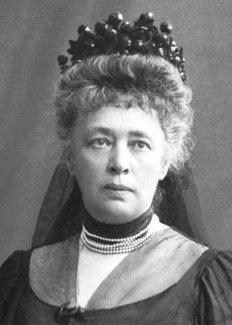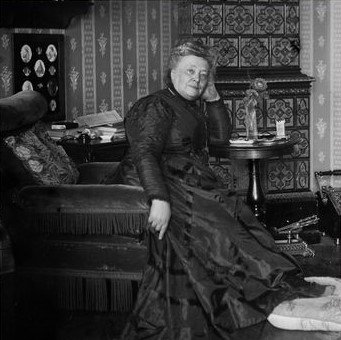Born as Countess Kinsky to a posthumous field marshal, Bertha von Suttner came into the Austrian court on June 9, 1843, in Prague, Bohemia. Still living fitfully on family funds, Bertha enjoyed studying languages and music, reading, and traveling. However, due to her mother’s depleting funds, von Suttner decided to work as a governess for the four daughters of the Suttner household. Here, Bertha met the youngest and her future husband, Baron Arthur Gundaccar von Suttner.
In 1876, von Suttner moved to Paris to work as a secretary for Alfred Nobel. Although she worked with him for a brief period, they maintained correspondence for the rest of their lives, until Nobel died in 1896. Scholars believe it is von Suttner’s influence that motivated Nobel to include a peace prize among the other awards provided in his will.
Cover of Die Waffen nieder, source: Wikipedia
von Suttner published her most well-known work, Die Waffen nieder [Lay Down Your Arms], in late 1889. The book tremendously influenced European society. Not only did von Suttner predict the increasing citizen involvement in war and the dangers of European governments’ increased armament, but she also asserted that research in radium would produce weapons of terror. Moreover, von Suttner publicly denounced the rising anti-Semitism movement throughout Europe, noting that they were moving Europe towards destruction.
In 1905, von Suttner was the first woman to win the Nobel Peace Prize. During her acceptance speech, she promoted ideas of an international court of justice and international laws to regulate the conduct of nations.
von Suttner died ten days before the assassination of Archduke Franz Ferdinand, the tinderbox event that threw Europe into World War I. Nevertheless, she left predictions on the terrible effects radium weapons would have on soldiers and citizens alike.
Bertha von Suttner was an activist for pacifism and women’s rights, source: www.mirror.co.uk
Bertha von Suttner’s commitment to peace and anti-war movements created the building block to many significant changes in Europe. Unfortunately, the political figures and aristocracy she argued against ignored her warnings. However, in the wake of World War II, the European governments put her ideas of international justice into effect, and the world’s nations use a system of international laws for peace and humanitarianism.
Written by Josie Nunn
Sources:
Bertha von Suttner – Biographical. NobelPrize.org. Nobel Prize Outreach AB 2023. Mon. 15 May 2023. https://www.nobelprize.org/prizes/peace/1905/suttner/biographical/.
Britannica, The Editors of Encyclopaedia. "Bertha, baroness von Suttner". Encyclopedia Britannica, 17 Jun. 2022, https://www.britannica.com/biography/Bertha-Freifrau-von-Suttner.
Holt, Niles. “THE ‘POPULAR PACIFISM’ OF BERTHA VON SUTTNER.” Peace Research, vol. 34, no. 1, 2002, pp. 117–25. JSTOR, http://www.jstor.org/stable/23608034.



